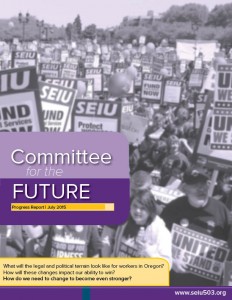Our SEIU 503 Committee for the Future is charged with evaluating the various threats our union is facing and developing specific proposals for how we can adapt and thrive in a changing world.
After meeting and deliberating for nearly a year, we’re excited to present a progress report to our members. After the committee issues its final recommendations, it will be up to the General Council and Board of Directors to act on any recommendations that would change our bylaws and governing documents.
Our work is far from done… we need to hear from you. Download the report to read our findings (or scroll down to view the summary), and then share your feedback, priorities, and ideas with us!
Committee for the Future
Progress Report Summary | July 2015
What will the legal and political terrain look like for workers in Oregon in 2016? In 2020?
How will these changes impact our ability to win?
How do we need to change to overcome these challenges and become even stronger?
These are the fundamental questions guiding the creation and work of the Committee for the Future (CFF). Established by our 2014 General Council—our local’s highest governance body— CFF is charged with evaluating the threats our union is facing and developing specific proposals for how we can adapt and thrive in a rapidly changing world.
Unprecedented legal and political attacks
The urgency and content of the committee’s work is driven in large part by public sector unions being targeted by sophisticated legal and political attacks. Across the country, public workers have seen their rights rolled back and their quality of life eroded by these attacks. Although we have consistently (but narrowly) defeated these efforts in Oregon, deep-pocketed anti-worker forces have already filed multiple “right-to-work” ballot measures for 2016, intending to destroy workers’ rights and power by decimating union membership.
Our opponents also have moved cases to the Supreme Court that the conservative majority is eager to use to overturn this longstanding fundamental principle of labor: everyone benefits from union-negotiated raises, benefits, and working conditions, so everyone should pay their fair share of the costs of getting and protecting them. In 2014 the court ruled out fair share fees for about half of our union: homecare, childcare, and adult foster care providers. Now the court has taken up a new case which – like the ballot measures – could overturn fair share representation for all public sector workers in 2016, a devastating attack on union power and resources.
Preparing our Union for a New Reality
Based on considerable research and discussion, the committee is considering issuing the following recommendations.
INCREASING MEMBERSHIP, IMPROVING ENGAGEMENT
- Expand Membership to welcome non-union workers and allies into our ranks.
- Support strategies for building power in our industries, beyond just collective bargaining.
- Promote, and explore expanding, member benefits.
- Explore codifying the grievance and arbitration procedure into law.
EXPANDING MEMBER OWNERSHIP OF PROGRAM, REDUCING RELIANCE ON STAFF
- Support for longer contracts to allow more time to build upon contract victories and for engaging members in worksite and issue fights, lobbying, and organizing.
- Empowering sublocals with the idea of making internal organizing goals a requirement, and not merely a recommendation, of sublocal leadership.
- Training for more empowerment so more member leaders “own our union” in their worksite or area.
- Adopting electronic voting where permissible to reduce costs and increase participation.
- Adapt steward elections to ensure our leaders are more reflective of and responsive to their membership.
MAKING UNION GOVERNANCE MORE ACCESSIBLE, LESS COSTLY
- Revise our Purpose Statement for greater clarity, inspiration, and to match our comprehensive mission.
- Create a robust discussion of the pros and cons of sublocals in order to evaluate the structures and determine ways of mitigating any weaknesses.
- Consider making Retiree Membership automatic, including ways for retirees to pay their dues more easily.
- Establish a committee to conduct a review and rationalization of our union’s governing documents.
INCREASING REVENUE AND MORE WISELY SPENDING RESOURCES
- Reduce costs on mileage, including ending reimbursement for local trips, and encouraging members who can afford to do so to forgo reimbursement.
- Reduce food costs by adjusting timing of meetings and making them more efficient.
- Reduce conference frequency and budget by evaluating the true purpose, costs, and benefits of each event and exploring other options, such as conference calls.
- Reduce non-essential bargaining costs.
BUILDING POWER WITH COMMUNITY ALLIES
- Create an affiliated non-profit organization that could tap into grants and other resources, and develop new programs that link SEIU members and the broader community.
- Open up some events to individuals from allied organizations.
- Invest in the development of our public image and communications plan, including continuing with campaigns that feature and resonate with people outside our union.
- Staff community work appropriately
DEVELOPING A MORE INCLUSIVE, PARTICIPATORY, EFFECTIVE CULTURE
- Stop the “Us vs Them” attitude: We must embrace that we are one union engaged in one struggle together.
- Stop third-partying our union: When we talk about “the union” as a foreign body rather than as “us” or “we,” it sends a message that our union is something other than what we are: a collection of individuals pursuing common goals.
- Organizational Equity and Inclusion must guide how we do everything.
- “Education to Action:” We need to lift up action (organizing other workers, lobbying, rallying, phonebanking, etc.) as the vehicle that truly builds and exercises power.
- Engage the broader person: One way we can engage the broader public is by relating our common struggle, talking about values and our stories, and making our space and events more open to families.

